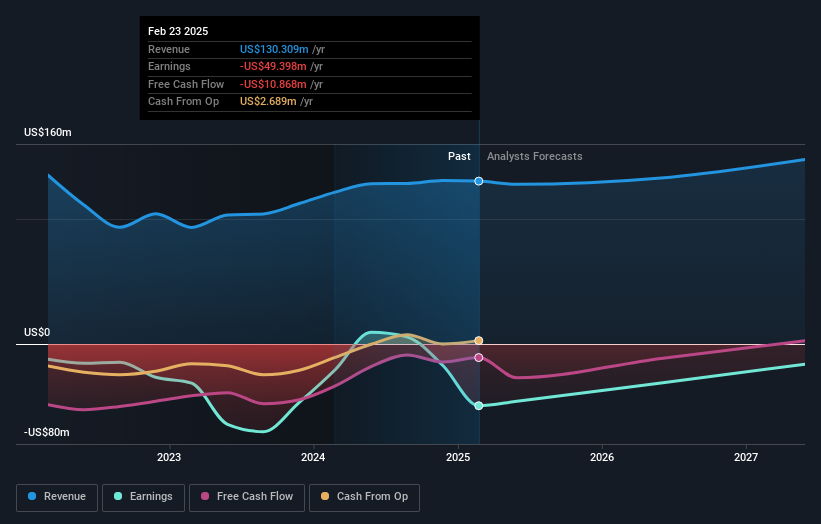Please use a PC Browser to access Register-Tadawul
Hedge funds owners may consider drastic measures as Lifecore Biomedical, Inc.'s (NASDAQ:LFCR) recent US$65m drop adds to long-term losses
Lifecore Biomedical, Inc. - Common Stock LFCR | 7.79 | -0.26% |
Key Insights
- Institutions' substantial holdings in Lifecore Biomedical implies that they have significant influence over the company's share price
- The top 7 shareholders own 54% of the company
Every investor in Lifecore Biomedical, Inc. (NASDAQ:LFCR) should be aware of the most powerful shareholder groups. The group holding the most number of shares in the company, around 45% to be precise, is hedge funds. Put another way, the group faces the maximum upside potential (or downside risk).
And so it follows that hedge funds investors was the group most impacted after the company's market cap fell to US$196m last week after a 25% drop in the share price. Needless to say, the recent loss which further adds to the one-year loss to shareholders of 12% might not go down well especially with this category of shareholders. Hedge funds are often aggressively managed, usually with the goal of focusing on short-term profits. And given they have significant interest in Lifecore Biomedical, they have a lot of power, and if the company's performance doesn't improve, it could lead to them influencing management decisions that aren't in line with long-term objectives.
Let's take a closer look to see what the different types of shareholders can tell us about Lifecore Biomedical.

What Does The Institutional Ownership Tell Us About Lifecore Biomedical?
Institutional investors commonly compare their own returns to the returns of a commonly followed index. So they generally do consider buying larger companies that are included in the relevant benchmark index.
Lifecore Biomedical already has institutions on the share registry. Indeed, they own a respectable stake in the company. This implies the analysts working for those institutions have looked at the stock and they like it. But just like anyone else, they could be wrong. When multiple institutions own a stock, there's always a risk that they are in a 'crowded trade'. When such a trade goes wrong, multiple parties may compete to sell stock fast. This risk is higher in a company without a history of growth. You can see Lifecore Biomedical's historic earnings and revenue below, but keep in mind there's always more to the story.

It looks like hedge funds own 45% of Lifecore Biomedical shares. That worth noting, since hedge funds are often quite active investors, who may try to influence management. Many want to see value creation (and a higher share price) in the short term or medium term. Wynnefield Capital, Inc. is currently the largest shareholder, with 13% of shares outstanding. For context, the second largest shareholder holds about 12% of the shares outstanding, followed by an ownership of 9.1% by the third-largest shareholder.
We also observed that the top 7 shareholders account for more than half of the share register, with a few smaller shareholders to balance the interests of the larger ones to a certain extent.
Researching institutional ownership is a good way to gauge and filter a stock's expected performance. The same can be achieved by studying analyst sentiments. While there is some analyst coverage, the company is probably not widely covered. So it could gain more attention, down the track.
Insider Ownership Of Lifecore Biomedical
The definition of company insiders can be subjective and does vary between jurisdictions. Our data reflects individual insiders, capturing board members at the very least. Company management run the business, but the CEO will answer to the board, even if he or she is a member of it.
I generally consider insider ownership to be a good thing. However, on some occasions it makes it more difficult for other shareholders to hold the board accountable for decisions.
Our data suggests that insiders own under 1% of Lifecore Biomedical, Inc. in their own names. It seems the board members have no more than US$1.9m worth of shares in the US$196m company. We generally like to see a board more invested. However it might be worth checking if those insiders have been buying.
General Public Ownership
With a 23% ownership, the general public, mostly comprising of individual investors, have some degree of sway over Lifecore Biomedical. While this size of ownership may not be enough to sway a policy decision in their favour, they can still make a collective impact on company policies.
Next Steps:
It's always worth thinking about the different groups who own shares in a company. But to understand Lifecore Biomedical better, we need to consider many other factors.
If you are like me, you may want to think about whether this company will grow or shrink. Luckily, you can check this free report showing analyst forecasts for its future .
NB: Figures in this article are calculated using data from the last twelve months, which refer to the 12-month period ending on the last date of the month the financial statement is dated. This may not be consistent with full year annual report figures.
This article by Simply Wall St is general in nature. We provide commentary based on historical data and analyst forecasts only using an unbiased methodology and our articles are not intended to be financial advice. It does not constitute a recommendation to buy or sell any stock, and does not take account of your objectives, or your financial situation. We aim to bring you long-term focused analysis driven by fundamental data. Note that our analysis may not factor in the latest price-sensitive company announcements or qualitative material. Simply Wall St has no position in any stocks mentioned.



